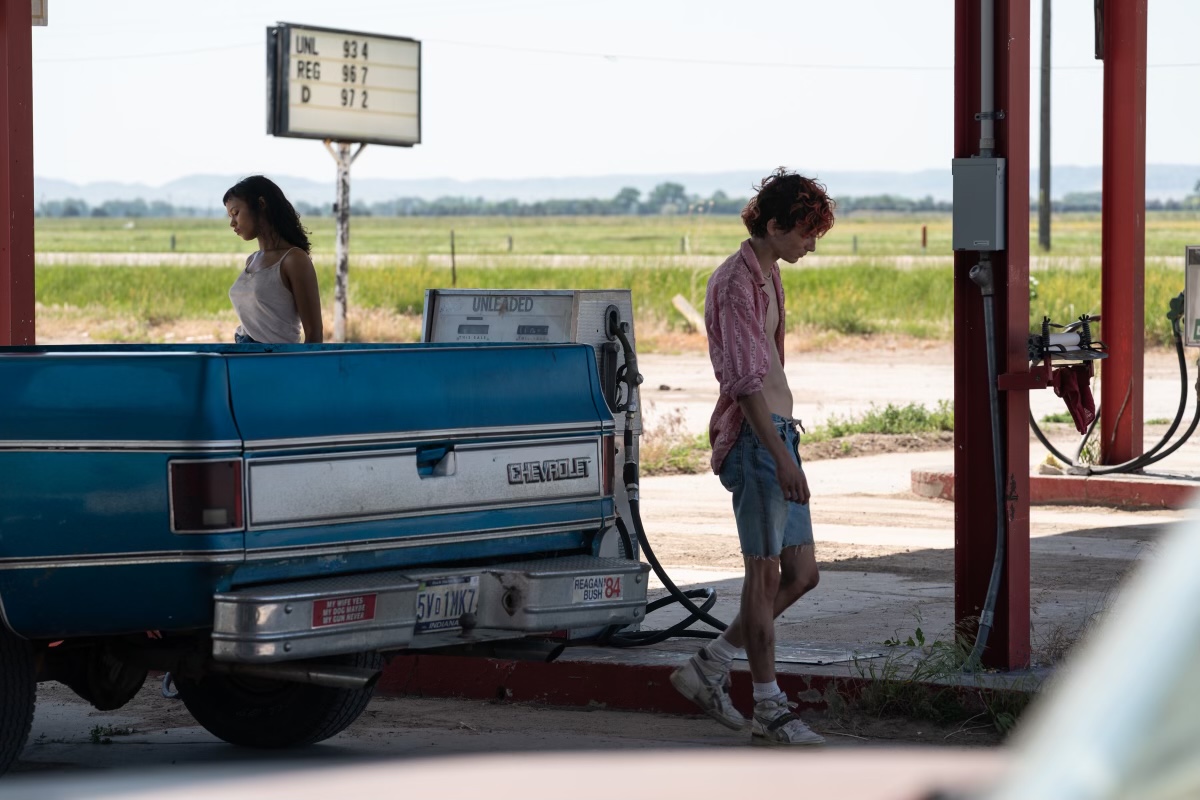On the second day of LFF, Luca Guadagnino takes us on a cannibal road trip with Bones and All, the people of Tunisia must face their past in Ashkal and a documentary explores the associations between David Lynch and The Wizard of Oz in Lynch/Oz.
Bones and All (dir. Luca Guadagnino)
Bones and All is the cannibal road movie of the year, as director Luca Guadagnino reunites with Timothee Chalamet in an adaptation of Camille DeAngelis’s novel. The film charts the adventures of two wayward youths with an appetite for human flesh trying to navigate 1980s America, and throughout their journey they learn that if they are going to be a fishes out of water, they may as well be piranhas.
Maren Yearly (Taylor Russell) is a graduating high school student who lives alone with her dad Frank (Andre Holland). They live a quiet life until Maren’s compulsions cause an incident which forces them to flee. For Maren has cannibalistic tendencies, a condition which finds her flung out into the world to fend for herself. She quickly encounters Sully, another “eater” (Mark Rylance) who opens a whole new terrifying world for Maren. But it is when she meets Lee (Chalamet), that she finally can see a future for her kind. So, these two crazy mixed-up kids embark on a road-trip across the mid-west in search of answers about Maren’s past.
After his disappointing remake of Suspiria in 2018, Guadagnino returns to form with Bones and All. The film successfully marries horror with the young adult and road movie genres to make a compelling, and at times nerve-wracking, story. The narrative charts the traumas passed down across generations and how the sins sowed by the parents are reaped by the children. For Maren and Lee never asked to be afflicted with their hunger, but instead both are left to navigate their condition alone, and they develop their own set of rules to stay alive and undetected. One immediately thinks of climate change as a relevant comparison, how the after-effects from generations of environmental neglect are never felt at the time, but decades later when the children are left to clean up the mess.
The performances across the board are superb, particularly Taylor Russell who brings an innocence and a world weariness to Maren, carrying the entire weight of the film upon her shoulders. Chalamet is reliably solid as Lee, offering a counterweight to Maren as the more experienced of the two, but who still carries his own baggage across state lines. Rylance is also terrific as the malevolent Sully, commanding his scenes with a quiet menace. The film is also filled with cameos including Michael Stuhlbarg, David Gordon Green, Chloe Sevigny and Jessica Harper. Each character pops up to enrich the flavour of the story without ever distracting the audience from the central characters’ journey.
Bones and All can be added to the pantheon of American road movies made by non-Americans, like Wim Wenders’s Paris, Texas, Andrea Arnold’s American Honey and Paolo Sorrentino’s This Must Be the Place; instances where the outsider eye finds the grace and the humour hidden in the corners of the American diaspora. The fact that Guadagnino mixes up this unique perspective with a tale about a couple of fine young cannibals, makes the film more unique, more inspired and all the more delicious.
Ashkal (dir. Youseff Chebbi)
A series of mysterious deaths kicks off a criminal investigation which leads to an interrogation of the collective unconscious of an entire society in Tunisian chiller Ashkal. What starts as an atmospheric police procedural quickly descends into a heart of darkness as the cops at the centre of the case struggle to navigate the societal rot that has persisted even a decade after the revolution.
Carthage Gardens is a real estate development established to house the super-rich which has become a ghost town of semi-constructed buildings after it was abandoned during the Tunisian revolution of 2010. Amidst the ruins, a caretaker of a building site is burned alive. Detectives Fatma (Fatma Oussaifi) and Batal (Mohamed Grayaa) catch the case and soon learn the victim is not the first to die by immolation in the area. So begins an investigation which deepens and becomes more mysterious, as the detectives struggle against the bureaucracy and corruption of the police force in search of answers. But for Fatma, the longer one looks into the fire, the more they are drawn to the flame.
Ashkal is a hard film to describe as it keeps its cards very close to the vest. While its set ups suggest a policer with a dark edge, the filmmakers use genre tropes to draw the audience in before letting them loose in a dark and mysterious maze. Drawing heavily from the impact of the Tunisian revolution with more than a little inspiration from True Detective, director and co-writer Youssef Chebbi charts a course into a cityscape of the mind. There is a clear line drawn between the haves (corrupt officials who escape prosecution by co-operating with officials) and the have-nots (those who call the semi-completed development home) yet there seems to be a netherworld in between that all citizens inhabit, a forest that might only be renewed through a cleansing fire.
Director Chebbi brilliantly establishes this netherworld through deep shadows punctuated by individual sources of light (most notably, fire) and counteracts this rich cinematography with found footage inserts which add an extra dimension of dread to the proceedings. Navigating this netherworld are actors Oussaifi and Grayaa as two generations of police who both struggle with their roles in the new regime; Oussaifi’s Fatma is young and wants to fight injustice, but she is still a cop and is distrusted by her community, while Grayaa’s Batal was a tool of the previous government and is dubiously wealthy, his desire to close the case quickly at odds with his young partner. They both brilliantly portray the push and pull of Tunisia’s struggle with its own identity.
Ashkal is a film that provides no easy answers, and nor should it for a society in search of its identity in the wake of a revolution. But for the people who suffered throughout a destructive regime, they deserve justice, and for those who benefited, they deserve to be punished. Yet, as the characters in the film demonstrate, nothing is ever that black and white when you are just trying to survive.
Lynch/Oz (dir. Alexandre O. Phillipe)
Art is never made in a vacuum, as all artists are influenced by those who came before. Every film, television series, painting and song is in conversation with each other as artists reach back into their pasts to find the kernel of inspiration that will drive them forward. In many cases, an artist will return to the same wellspring over and over again, as they work through a fascination with a particular subject or image. In the case of David Lynch, documentarian Alexandre O. Phillipe posits the most profound inspiration on his work is The Wizard of Oz.
Lynch/Oz is another deep dive into a filmmaker’s oeuvre from the director of 78/52 and Leap of Faith: William Friedkin on The Exorcist, with Phillipe enlisting a group of filmmakers and critics to explore Lynch’s work in relation to the classic film. They each make insightful observations about the way he tells stories and creates images that can be convincingly traced back to Dorothy on her journey down the yellow brick road. Phillipe refreshingly avoids a talking heads approach in favour of putting together six visual essays.
He edits together scenes from Lynch’s work, The Wizard of Oz and other films and artworks, tied together with narration written in collaboration with, and read by, artists who themselves, have been influenced by Lynch. Chapters are hosted by filmmakers such as Karyn Kusama, John Waters, Aaron Moorehead and Justin Benson and each section works in conversation with the next, but all contain fascinating revelations and connections of their own.
What is most interesting is the film posits that Wild at Heart, with its very overt references to The Wizard of Oz, is actually the film that has the least in common with the classic film, with Karyn Kusama positing that its Mulholland Drive that shares the most similarities. Lynch’s film features many “Oz-ian” elements but, as Kusama observes, in reverse, with Naomi Watts’s Betty beginning the film in a strange dreamscape and having to find her way back to reality. The film is also explores the dark side of Hollywood, which Judy Garland would have found herself navigating as a young woman, a journey that all but destroyed her, much like Betty and many other female protagonists in Lynch’s films.
David Lynch makes for a perfect subject for exploration as he is always so coy about the themes and meanings behind his own films, leaving it up to audiences to create their own answers. Lynch/Oz is a perfect experience for Lynch fans, made by Lynch fans, as it delves deep into aspects of his films that might not be so apparent at the first or even twenty-first viewing. It is as absorbing as a Lynch film, with each section taking the viewer down their own yellow brick road with the hope that together we may get even a tiny glimpse of the real Lynch, the man behind the curtain.



